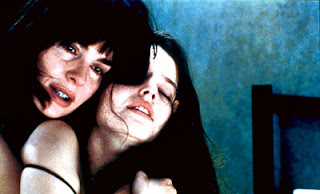Drôle over

Why in the hell did Catherine Breillat make Sex Is Comedy? (I figured, what with 2 Days in Paris in theaters, I would reassess another French filmmaker's vanity project last night.) Now I adore Catherine Breillat. She is certainly one of my favorite thinkers - favorite female filmmaker for certain. Breillat became famous in France in 1969 when, at 16, she published her first novel "L'Homme Facile" (then strangely translated into "A Man for the Asking"). It was subsequently banned to any reader under the age of 18. Her first filmic endeavor 7 years later, Une Vraie Jeune Fille (A Real Young Girl), met a similar fate when it was banned outright for the remainder of the century.
Never relenting in either arena (though filmmaking was mostly limited to screenwriting throughout the 80's), Breillat has garnered a good deal of dubious street cred in her native France. Her name elsewhere (unless followed with "the director of Romance") is far from household. Sex Is Comedy goes above and beyond an earned entitlement as French provocateur, assuming that the on set goingson of a Breillat film are fascinating enough warrant a feature from. This is Breillat making a film about Breillat making a film. Now as an ardent admirer of this staunch character, it's something that I have no problem sitting through. But as an average filmgoer, not clued in or fanned out to Breillat's ouvre, the film's riding purpose may be a bit lite. Funny that it should be lite considering Breillat's films are almost always endowed with a wickedly analytical fatalism. But here, not much goes on but the musing on why it is actors have a difficult time shooting sex scenes. Of course, the view could certainly pan out to include our views on sexuality as a people, but so honed is Breillat's trademark tyranny that the absurdity of the situation is paramount to its greater implications.
 Which is not to say the film is a chore. Breillat (assuredly at times verbatim) makes her Jeanne spout terse condemnations and (half-heartedly) rampant self-criticisms. Jeanne is played by Anne Parillaud (La Femme Nikita), who does resemble Breillat in her intensity, though is far more physically ideal than the then 54 year old filmmaker. It's all about Jeanne, really. She has interactions with her stars: the vain and incredulous Grégoire Colin who refuses to remove his socks in one scene "parce que je suis un fetishist;" the icy Roxane Mesquida (revisiting her year prior sex scene from Breillat's Fat Girl), an actrice who realizes what her male counterpart does not: her function in this system. Actors are whores. Breillat makes that quite clear. Jeanne's close relationship with her PA, Leo, is one of vanity. In her constant assault of sharply honed dialogue, never does she speak to him. He is a mirror for Jeanne's ideas (she frequently looks through him) and, a body to use in the choreography of the key scenes of intimacy. The power struggle of the female director guiding the subservient male PA is certainly not lost on Breillat.
Which is not to say the film is a chore. Breillat (assuredly at times verbatim) makes her Jeanne spout terse condemnations and (half-heartedly) rampant self-criticisms. Jeanne is played by Anne Parillaud (La Femme Nikita), who does resemble Breillat in her intensity, though is far more physically ideal than the then 54 year old filmmaker. It's all about Jeanne, really. She has interactions with her stars: the vain and incredulous Grégoire Colin who refuses to remove his socks in one scene "parce que je suis un fetishist;" the icy Roxane Mesquida (revisiting her year prior sex scene from Breillat's Fat Girl), an actrice who realizes what her male counterpart does not: her function in this system. Actors are whores. Breillat makes that quite clear. Jeanne's close relationship with her PA, Leo, is one of vanity. In her constant assault of sharply honed dialogue, never does she speak to him. He is a mirror for Jeanne's ideas (she frequently looks through him) and, a body to use in the choreography of the key scenes of intimacy. The power struggle of the female director guiding the subservient male PA is certainly not lost on Breillat.
But an overall sense of purpose is. Surely following Fat Girl's weight with a slighter, livelier work, the film is essentially a gesture. Breillat has certainly earned the right to state her intentions and highlight some trappings, but universality has never been one of Breillat's stronger traits. Her heavier films alienate people because of their graphic scenes and analytical pomposity. This alienates because, without an investment in her other works, is both a trifle and yet too specific.
Expect a return to form when (if) Breillat's newest offering, Une Vieille Maîtresse (And Old Mistress) hits theaters stateside. And pray for a return to health, as Breillat suffered a brain hemorrhage which paralyzed part of her body before the filming of Maîtresse. She's mobile now, and like Jeanne, she walks about with a befitting cane.

0 Comments:
Post a Comment
<< Home